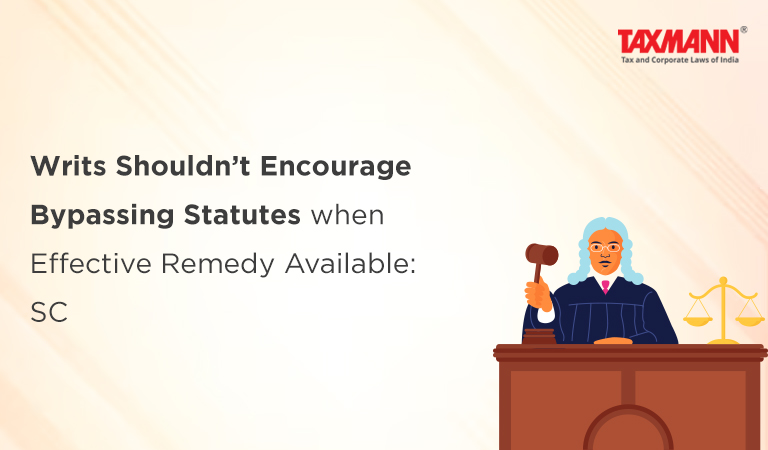Writs Shouldn’t Encourage Bypassing Statutes when Effective Remedy Available: SC
- Blog|News|FEMA & Banking|
- 2 Min Read
- By Taxmann
- |
- Last Updated on 24 April, 2023

Case Details: South Indian Bank Ltd. v. Naveen Mathew Philip - [2023] 149 taxmann.com 330 (SC)
Judiciary and Counsel Details
-
- Sanjiv Khanna & M.M. Sundresh, JJ.
Facts of the Case
In the instant case, the borrowers/respondents had obtained two loans from the appellant bank and their accounts were declared as non-performing assets (NPAs). The bank issued notices u/s 13(2) of the Securitisation and Reconstruction of Financial Assets and Enforcement of Security Interest Act, 2002 (SARFAESI Act, 2002).
In response, the borrowers sought twelve months’ time to repay the loan. In 2021, the Debt Recovery Tribunal (DRT) and Debts Recovery Appellate Tribunal (DRAT) were not functional and the Supreme Court, taking note of the situation had requested the concerned High Courts to entertain matters falling within the jurisdiction of DRTs and DRATs under Article 226 of the Constitution.
Since the concerned DRT was non-functional, the borrowers filed a writ petition before the Kerala High Court, challenging the notice u/s 13(2) of the SARFAESI Act, 2002. A direction was issued to the appellants to consider the proposal placed and the borrowers were allowed to remit dues accrued in five instalments instead of twelve.
However, the extended benefit conferred was not utilized by the borrowers, and therefore, a reminder was also sent. Receiving no response, two notices under section 13(4), were issued. Impugning aforesaid notices, two writ petitions were filed by borrowers.
Although the DRT was not functional at the time of filing the aforesaid Writ Petitions, it became so from March, 2022. Thereafter, an order was passed by the Supreme Court in a Special Leave Petition ordering that pending matters ought to be transferred to concerned Tribunals when they start functioning with their respective Presiding Officers duly in charge.
Notwithstanding such orders, the High Court allowed the borrowers to make deferred payments in 20 instalments, a relief which was more than one prayed for.
Supreme Court Held
The Supreme Court observed that when a statute prescribes a particular mode, an attempt to circumvent shall not be encouraged by a writ court. Further, a litigant cannot avoid non-compliance by approaching the Tribunal which requires the prescription of fees and the use of constitutional remedy as an alternative.
The Supreme Court held that the powers conferred under Article 226 of the Constitution are rather wide, however, they are required to be exercised only in extraordinary circumstances. Therefore, where an alternative remedy under SARFAESI Act was available, the litigant could not have used a constitutional remedy as an alternative.
Disclaimer: The content/information published on the website is only for general information of the user and shall not be construed as legal advice. While the Taxmann has exercised reasonable efforts to ensure the veracity of information/content published, Taxmann shall be under no liability in any manner whatsoever for incorrect information, if any.

Taxmann Publications has a dedicated in-house Research & Editorial Team. This team consists of a team of Chartered Accountants, Company Secretaries, and Lawyers. This team works under the guidance and supervision of editor-in-chief Mr Rakesh Bhargava.
The Research and Editorial Team is responsible for developing reliable and accurate content for the readers. The team follows the six-sigma approach to achieve the benchmark of zero error in its publications and research platforms. The team ensures that the following publication guidelines are thoroughly followed while developing the content:
- The statutory material is obtained only from the authorized and reliable sources
- All the latest developments in the judicial and legislative fields are covered
- Prepare the analytical write-ups on current, controversial, and important issues to help the readers to understand the concept and its implications
- Every content published by Taxmann is complete, accurate and lucid
- All evidence-based statements are supported with proper reference to Section, Circular No., Notification No. or citations
- The golden rules of grammar, style and consistency are thoroughly followed
- Font and size that’s easy to read and remain consistent across all imprint and digital publications are applied



 CA | CS | CMA
CA | CS | CMA
